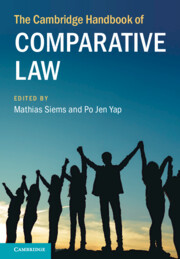Book contents
- The Cambridge Handbook of Comparative Law
- The Cambridge Handbook of Comparative Law
- Copyright page
- Contents
- Figures
- Tables
- Contributors
- Preface
- Abbreviations
- 1 Introduction
- Part I Methods of Comparative Law
- Part II Legal Families and Geographical Comparisons
- Part III Central Themes in Comparative Law
- 19 The Tradition of Comparative Law: Comparison and Its Colonial Legacies
- 20 Decolonial Theory and Comparative Law
- 21 Legal Transplants: A Theoretical Framework and a Case Study from Public Law
- 22 Legal Transplants: A Case Study of Private Law in Its Historical Context
- 23 Convergence and Divergence in Public Law
- 24 Convergence and Divergence in Company Law
- 25 Law and Development
- 26 Divided Legal Systems
- 27 Legal Pluralism and Commerce
- Part IV Comparative Law beyond the State
- Index
27 - Legal Pluralism and Commerce
from Part III - Central Themes in Comparative Law
Published online by Cambridge University Press: 26 January 2024
- The Cambridge Handbook of Comparative Law
- The Cambridge Handbook of Comparative Law
- Copyright page
- Contents
- Figures
- Tables
- Contributors
- Preface
- Abbreviations
- 1 Introduction
- Part I Methods of Comparative Law
- Part II Legal Families and Geographical Comparisons
- Part III Central Themes in Comparative Law
- 19 The Tradition of Comparative Law: Comparison and Its Colonial Legacies
- 20 Decolonial Theory and Comparative Law
- 21 Legal Transplants: A Theoretical Framework and a Case Study from Public Law
- 22 Legal Transplants: A Case Study of Private Law in Its Historical Context
- 23 Convergence and Divergence in Public Law
- 24 Convergence and Divergence in Company Law
- 25 Law and Development
- 26 Divided Legal Systems
- 27 Legal Pluralism and Commerce
- Part IV Comparative Law beyond the State
- Index
Summary
As law is largely a country-specific discipline, formal African legal systems differ from one country to another. The commonly shared feature, however, is that of deep legal pluralism, which produces a multiplicity of normative orders in each society. National legal systems are influenced by colonial history and underpinned by customary law, resulting in a multi-layered legal environment overall. This chapter highlights the influence of traditional usages as a distinct but integral source of business law within pluralist African legal systems. The ‘survival’ of customary arbitration, for instance, clearly indicates the value which local communities attach to familiar transactional and dispute resolution frameworks which more suitably accommodate their voices. This singular feature underscores the importance of an exploratory and inclusive approach to identifying other elements of pluralism in the field of business law in Africa. These include the widening reach of regional law, the huge scale of informal cross-border trade, differing legal frameworks for formal cross-border trade facilitation and the monumental growth of China’s investments in Africa, all of which constitute substantive research areas in themselves in the study of the pertinent subject of legal pluralism in commerce in Africa.
- Type
- Chapter
- Information
- The Cambridge Handbook of Comparative Law , pp. 544 - 558Publisher: Cambridge University PressPrint publication year: 2024

